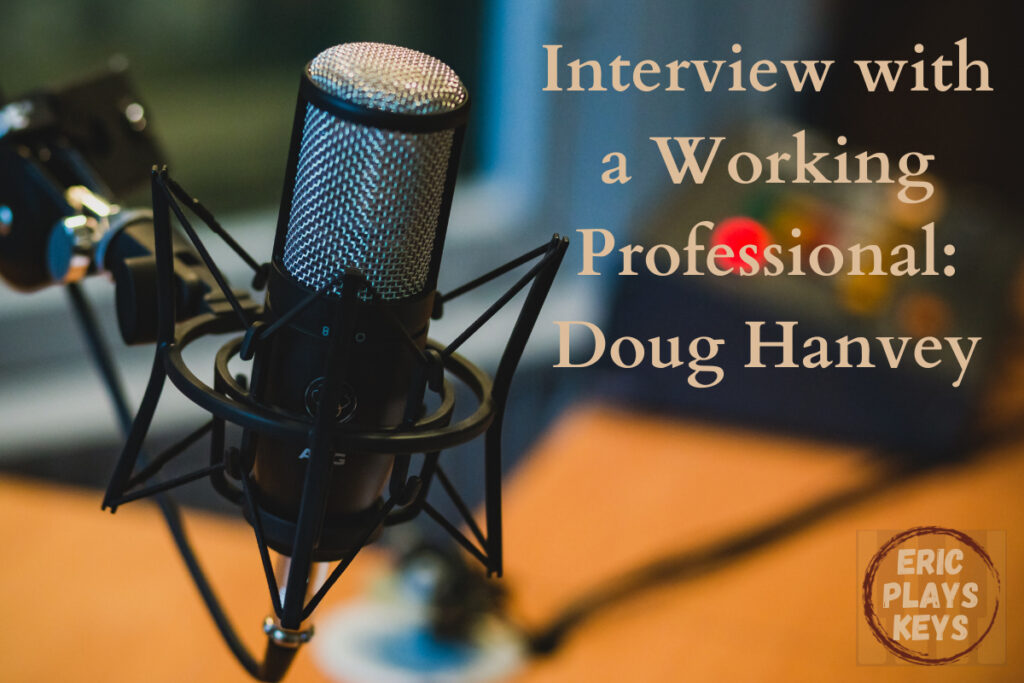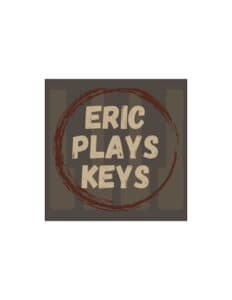
Doug Hanvey is founder of Creative Keyboardist, a music school that specializes in virtual piano lessons for adults. We interviewed each other to provide readers with additional perspectives from working professionals. You can find my interview on his website here.
1. Tell us a bit of background about how you became a jazz pianist.
Well, I don’t consider myself a jazz pianist per se. While I did formally study jazz piano, jazz never became my main focus as a player. However, it has strongly influenced how I teach piano, in that I think that many of the skills that jazz players need to master are useful for just about any pianist. It’s also influenced my creative work. For example, I’ve written numerous jazz-influenced arrangements. But as a player, I’m more of a generalist. I grew up studying classical music, but followed my own musical and creative interests along the way. When I was about 12 years old, I fell in love with ragtime and learn how to play most of the Joplin rags. I then fell in love with Rhapsody in Blue by George Gershwin and devoted a year to teaching myself that piece. I started composing when I was six; as a teenager my dream was to be a professional pop songwriter.
2. What do you practice? Do you have a routine? How has this changed over time?
I practice most days in the morning, but as a busy teacher, I unfortunately don’t have as much time to practice as I would like. (I’m sure I’m not the only music teacher to feel this way!) The music I most enjoy practicing these days is Baroque. As a player, I didn’t discover the importance of Bach until my 20s. When I did, I realized just how fundamental his music is to keyboard playing. This is interesting to me because Baroque music is not necessarily my favorite style to listen to! But it is probably my favorite to play, at least these days. It is so useful for improving and maintaining technique, hand independence, the ability to bring out distinct musical lines, etc. My experience is that its polyphonic nature makes it endlessly interesting to play compared to later, more homophonic styles.
3. Do you think there’s a point at which a person is too old to learn piano? What age do you recommend starting to learn?
Before they start lessons, many older keyboard students wonder: “Is it harder to learn piano as an adult?” I do think the average person can learn the basics at any age. That said, all other things being equal, the earlier you start the better. However, adults do have some learning advantages over kids such as the ability to concentrate for longer periods of time, intellectual maturity, hard-won learning skills etc.
4. What do you think separates good musicians from great musicians?
Interesting question! I’ve been influenced in my thinking about this by a book called Talent Is Overrated. While there probably is some degree of genetic predisposition towards excellent musicianship, and random environmental factors play a role (having the luck to find good teachers, for example), I think most of the difference between good and great musicians probably comes down to how much harder the “great” ones are willing to practice.
5. What are some skills outside of music that are important for musicians to develop?
Self-care skills are very important: eating well, exercising, getting enough sleep, etc. These directly impact one’s ability to practice and improve as a player. Organizational, business and marketing skills are also very important (yet under-appreciated by many musicians), unless you’re one of those rare people who make so much money that you can hire others to do those things!
6. Are there fundamental exercises, techniques, or strategies that you teach to all of your students?
I think it’s important for piano students to learn how to practice and eventually be able to teach themselves, at least to some degree. So I’m probably more explicit than most teachers when imparting practicing techniques and strategies.
7. Do you think it’s important to learn other genres of music apart from your main area of interest?
As someone who listens to and appreciates many styles of music – including many non-keyboard styles – I would say yes, definitely! As a teacher, one of the things I enjoy most is introducing students to styles they may not have had much exposure to. More often than not, I would say that exposure to a new style, especially by learning to play music in that style, leads to a deeper appreciation of it. Learning about other genres can inform how you play your favorite styles, and perhaps take you in new and interesting musical directions.
8. How difficult is it to be a full-time jazz piano player in today’s world? How difficult is it to be a part-time jazz pianist?
While I’m not an expert on that topic, my sense is that since jazz has generally had a relatively small audience compared to rock/pop etc., that it could be quite challenging. I’ve experienced something like this myself as a musical theater composer. It’s pretty challenging to “make it” on Broadway when musical theater has a relatively small audience to begin with, and when producers are hiring already-successful songwriters for their next show vs. taking a chance on an unknown composer. I’m sure this is one of the biggest frustrations for many musicians in just about any genre. My jazz teacher pointed out that most professional musicians need to “wear more than one hat.” If you’re lucky and/or talented enough to be able to make a full-time living as a player, great! But most professional musicians also do other things: teach, compose, manage other musicians, etc.
9. What is your advice for staying motivated throughout your musical journey?
Get to know what your best skills are, and don’t forget who your true “audience” is. Try to put those two things together. For me, I realized relatively early in my career that teaching was my favorite and possibly best skill, and that my natural “audience” was adults. I put the two together, and Creative Keyboardist, a music school that specializes in virtual piano lessons for adults, was the result.
Doug Hanvey is the founder of Creative Keyboardist.
